Current Affairs, Informative
Glaukos Project’s impact on Fashion and Fishing industries
May 28, 2024
Unveiling advancements in sustainability
BRUSSELS, MAY 8, 2024
The Glaukos project, funded by BBI JU as part of the Horizon 2020 program of the European Union, has come to a conclusion after four years of research and innovation in the fashion and fishing sectors. The holistic approach implemented by the project aimed to redesign the entire life cycle of clothing and fishing gear to significantly improve their sustainability performance, while also meeting the technical needs of end users. The project final event represented a unique opportunity to showcase the results obtained in the form of valuable knowledge for the various actors along the value chain.
The main objective was to share with policymakers and other stakeholders the main exploitable assets generated by the project, such as knowledge, methodologies, successes, and failures. In addition, project’s partners presented controversial topics and technical challenges for the fashion and fishing sectors, while providing recommendations for future research programs, discussing also about the definition of marine friendly biopolymers and how this methodological approach could be integrated into innovative market applications in fashion and fishing industries.

During the second part of the event, Glaukos’ industrial partners took part in a roundtable discussion on marine-friendly biopolymers and market applications, discussing future directions in fashion and fishing industries better responding to sustainability challenges.

REDEFINING BIO-BASED PLASTICS
In the domain of environmental research, the journey from project inception to policy implementation is often intricate and challenging. However, the Glaukos project stand out as a beacon of success in effectively bridging the gap between research endeavours and policy formulations. Through a concerted effort to engage stakeholders and foster meaningful dialogue, Glaukos has not only raised awareness but has also stimulated crucial market debates on pressing environmental issues, particularly surrounding biobased and biodegradable plastics.

One of the standout achievements of the Glaukos project is its pioneering work in bio-based plastics. The development of sustainable materials has been a complex process, involving challenges such as polymerization, spinning, coating, and weaving. Nevertheless, through rigorous research and innovation, the project has developed new biopolymers that offer improved biodegradability without compromising on performance. This breakthrough is crucial for both fashion and fishing industries, where the environmental impact of materials has been a longstanding concern.
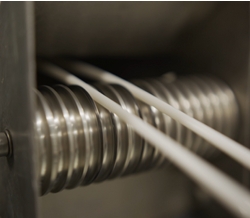
During the project’s final event, experts highlighted the importance of bio-based plastics in reducing environmental persistence and promoting biodegradability. For the fishing industry, the Glaukos project has made significant progress towards the creation of marine-friendly fishing gear. In fact, traditional fishing nets and ropes often made from non biodegradable materials, pose a severe threat to marine ecosystems. In the fashion sector, Glaukos has addressed the issue of textile waste and its environmental impact. By developing biodegradable and bio based materials, the project offers a sustainable alternative to traditional textiles.
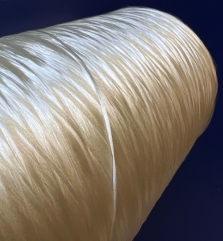
These innovations not only reduce the environmental footprint but also support circular economy principles by making materials easier to recycle and upcycle. By developing safe and sustainable by design polymers for biodegradability, the project explored using enzymes and engineered microbes to break down these materials into their monomeric forms. These can then be metabolized by bacteria to produce new biopolymers, closing the loop in the material lifecycle.
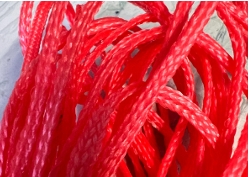
The project went also beyond traditional life cycle assessments by adopting a holistic environmental sustainability framework. This comprehensive approach considered multiple environmental indicators to avoid sustainability tunnel vision and ensure a balanced evaluation of impacts and trade-offs.
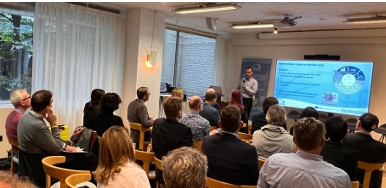
MARINE-FRIENDLY BIOPOLYMERS
Central to Glaukos’ success was its innovative methodological approach to defining and promoting marine-friendly biopolymers. Through its assessment scheme, the project emphasized the importance of scientifically assessing the eco-toxicity impact of materials on marine environments rather than relying on generalized notions that “plastic is bad”. The project in fact developed robust methods to assess the biodegradability of materials specifically in marine conditions,
finally:
- establishing testing protocols to measure the mechanical degradation of materials. This
ensures that fishing gear, if lost at sea, would lose its mechanical strength, allowing marine
fauna to escape entanglement. - addressing the potential chemical impacts, particularly endocrine disruptors. This quick and
sensitive test screens for harmful chemicals and ensures that new materials do not pose toxic
risks to marine life.Through collaborative efforts and rigorous debate with stakeholders, Glaukos fine-tuned and
validated this conceptual framework for marine-friendly biopolymers, laying the groundwork for
future research and policy interventions in this critical area
STAKEHOLDER ENGAGEMENT ANDPOLICY INTEGRATION
A critical aspect of the Glaukos project was its extensive stakeholder engagement and efforts to bridge the gap between research and policy. In fact, the 10 workshops organised by the project served as catalysts for dialogue, enabling participants to exchange insights, share concerns, and collectively explore solutions to environmental challenges.
The Glaukos project implemented a “Projects2Policy” format, in collaboration with Bio-Plastics Europe project, aiming to translate research findings into actionable policy recommendations. This approach not only facilitated the exploitation of project results but also informed future policies to support the adoption of bio-based and biodegradable materials . With over 400 stakeholders actively involved, Glaukos demonstrated its capacity to garner widespread support and participation, far exceeding initial expectations. This achievement underscores the project’s relevance and impact, positioning Glaukos as a pivotal player in the domain of environmental research and policy development.
Recognizing the complexities and nuances inherent in sustainability efforts, Glaukos adopted a multidimensional model that emphasized holistic solutions and considered the entire life cycle of materials to unlock the potential of bio-based and biodegradable plastics.
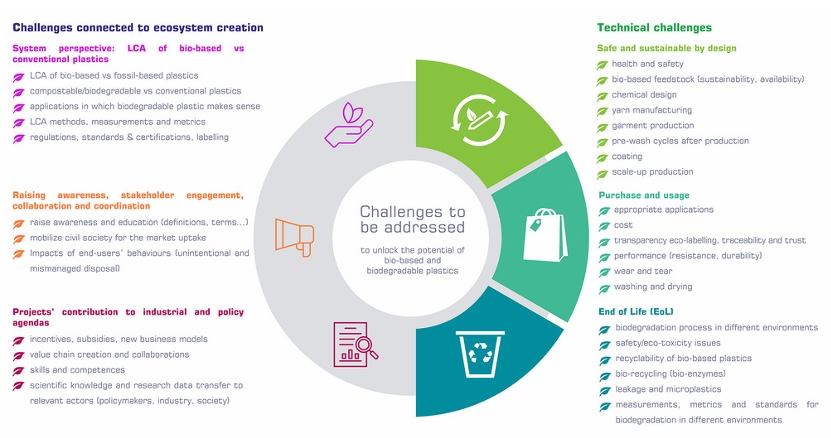
Moreover, Glaukos’ emphasis on practical outcomes and actionable recommendations ensured that its findings transcended the realm of academia and resonated with policymakers and industry stakeholders alike. By distilling complex research findings into accessible insights and recommendations, Glaukos empowered stakeholders to make informed decisions and drive meaningful change within their respective domains.
FUTURE DIRECTIONS
As the Glaukos project concludes, it leaves behind a legacy of innovation and collaboration that sets the stage for future advancements in sustainability. The project’s findings underscore the importance of continuous research and stakeholder involvement in driving sustainable practices. Moving forward, there is a need for ongoing support from policymakers to ensure the widespread adoption of these groundbreaking materials.
The success of the Glaukos project demonstrates that with concerted effort and innovative thinking, it is possible to create sustainable solutions that benefit both the environment and the industries that rely on these materials.
The future of sustainable fishing gear and clothing hinges on several factors. Tangible products that showcase the viability of biodegradable materials are essential for catalysing industry-wide adoption. Moreover, fostering a supportive ecosystem that encourages experimentation and innovation is paramount. As a matter of fact, the project has highlighted the need for a solid foundation and a framework to follow up on its initiatives, emphasizing the importance of early adopters in the market. By leveraging frameworks such as Horizon Europe and fostering cross sector partnerships with industrial players, such as CBE JU, opportunities for scaling up sustainable solutions emerge.
The journey towards sustainable fishing gear and clothing is not without its challenges. From navigating regulatory landscapes to overcoming technological barriers, there are hurdles to surmount. Yet, Glaukos project partners underscored a shared conviction that, by embracing a holistic approach that spans research, policy, and industry collaboration, the vision of a more sustainable future for fishing gear and clothing can be realized.

Looking ahead, the legacy of Glaukos demonstrates the power of collaboration and collective action in addressing global environmental challenges. As the initiative transitions from research to implementation, its impact will hopefully continue to reverberate across sectors, shaping policies, and practices for years to come. By fostering a culture of engagement, innovation, and sustainability, Glaukos has set a precedent for future initiatives seeking to bridge the gap between research and policy, paving the way for a more sustainable and resilient future for our planet.
As mentioned by Nelo Emerencia (BIC) in his closing remarks at the final event, comprising academic and commercial partners, the project exemplifies a collective commitment to sustainability within the fashion and fishing industries, recognising as particularly encouraging the genuine enthusiasm displayed by participating companies to embrace more eco-conscious practices, signalling a promising shift towards responsible stewardship of biological renewable resources.
Crucially, the Glaukos project extended beyond mere research and development; it actively engaged policymakers to ensure that its findings could provide recommendations for future policy measures. This collaborative approach, characterized by a continuous feedback loop between research and policy, held the key to effecting meaningful change on a systemic level.
As initiatives like the Glaukos project demonstrate, the path forward lies in harnessing innovation, fostering collaboration, and aligning interests towards a common goal: safeguarding our oceans for generations to come.

This project has received European funding from the Bio-based industries Joint Undertaking(JU) under the European Union’s Horizon 2020 research and innovation programme under grant agreement No 887711. The JU receives support from the European Union’s Horizon 2020 research and innovation programme and the Bio-based Industries Consortium.

